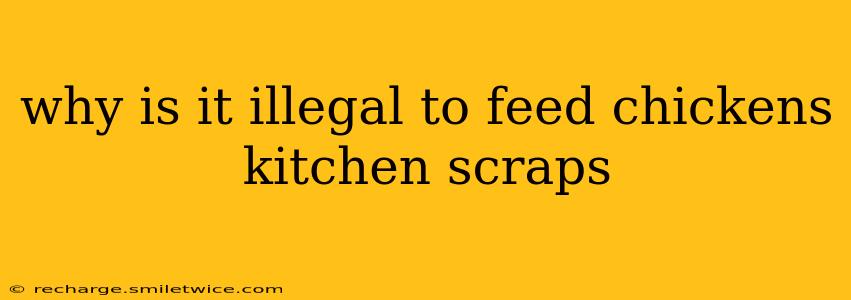Why Is It Illegal to Feed Chickens Kitchen Scraps? (Spoiler: It's Not Always Illegal!)
The statement "it's illegal to feed chickens kitchen scraps" is a broad generalization and often inaccurate. While there aren't widespread federal laws prohibiting this practice, the legality depends heavily on local ordinances and regulations. Many misconceptions surround this topic, so let's break it down.
What are the concerns regarding feeding chickens kitchen scraps?
This is a key question to understand why some jurisdictions might restrict feeding chickens certain types of food waste. The primary concerns revolve around:
- Disease Transmission: Improperly disposed-of kitchen scraps can attract rodents and other pests that can spread diseases to your flock and potentially contaminate nearby areas. Spoiled or rotten food is a significant risk factor.
- Attracting Pests: As mentioned above, food waste is a magnet for unwanted visitors like rats, raccoons, and stray animals. This can create a sanitation issue and potentially a safety hazard.
- Contamination of the Food Chain: If your chickens are raised for meat or eggs that you intend to consume or sell, feeding them contaminated scraps could contaminate your products. This is a serious food safety concern.
- Specific Food Hazards: Certain foods are toxic to chickens. For example, avocados, chocolate, onions, and garlic can cause serious illness or even death.
What are the local regulations concerning feeding chickens?
The specific rules vary dramatically based on your location. Some areas have very strict regulations regarding backyard chickens, including what they can be fed. These regulations might prohibit certain types of food scraps or stipulate specific disposal methods for chicken waste. It's crucial to check with your local city or county government to find out the specific regulations where you live. Often, this information is available on their website or through a phone call to the relevant department (often animal control or agriculture).
Can I feed my chickens any kitchen scraps?
Even if it's legal to feed your chickens kitchen scraps in your area, it doesn't mean you can feed them anything. The key is to practice responsible feeding. Suitable scraps include:
- Cooked Vegetables: Leftover cooked vegetables are generally safe and a good source of nutrients.
- Fruits (in moderation): Fruits are high in sugar and should be given sparingly to avoid digestive issues.
- Bread (in moderation): Bread should be given in small quantities, as it lacks nutritional value and can cause mold.
- Grains (cooked): Cooked grains like rice or oats can be a healthy supplement.
Avoid:
- Spoiled or rotten food: This is a major source of disease and should never be given to chickens.
- Meat and dairy: These can quickly spoil and attract unwanted pests.
- Citrus fruits: These can upset their stomachs.
- Toxic foods: Avoid avocados, chocolate, onions, garlic, and other toxic foods for chickens.
How can I safely feed my chickens kitchen scraps?
Safe and responsible feeding practices are crucial:
- Feed small quantities: Don't overload your chickens with scraps.
- Dispose of uneaten food promptly: This prevents attracting pests.
- Wash and clean scraps before feeding: This helps remove potential contaminants.
- Monitor your chickens: Observe them closely for any signs of illness after introducing new food scraps.
- Maintain good hygiene: Keep your coop and surrounding area clean to prevent the spread of disease.
In summary: Is it illegal to feed chickens kitchen scraps?
The legality of feeding your chickens kitchen scraps is highly dependent on local ordinances. Even if legal, responsible feeding practices are essential to maintain a healthy flock and prevent issues with pests and disease. Always check your local regulations and prioritize the safety and health of your chickens.
